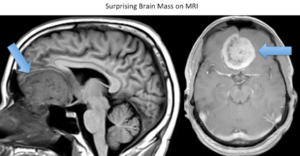When a patient develops a vague symptom like a headache, the thought of having a brain tumor is distant… but surely is a worst fear. Most patients watch the symptom for a while, but when it doesn’t resolve they may discuss with a physician. Headaches are reported in about 4.5% of all primary care visits. Even for a specialist in headaches, approximately 25% of a neurologist’s practice is based on this complaint. But about 90% of headache patients have completely normal tests and imaging studies. There may be an art to taking a history on headaches, but how can we know for whom to order brain scans and whom to simply reassure?
A new blood test has been developed which may eventually be used in the primary care setting to screen for brain tumors. By taking a small sample of blood, infrared light can check for a specific biochemical “fingerprint” commonly seen in brain cancers.
So far this technology has been proven useful in patients already diagnosed with brain cancer. After diagnosis, researchers verified that these patients’ blood displayed specific markers. As you can guess, this type of testing previously required a very expensive and complicated instrument and could only be completed in a formal laboratory. This simply is not cost effective for a disease, like brain cancer, that only occurs in less than 2% of people.
Luckily, new research has found a much cheaper device to quickly analyze samples. It can be operated with minimal training and does not otherwise require specialized handling of the blood sample. Simply put, this device could be placed in a primary care office.
While this technology is not yet as simple as picking up a urine dipstick at your local pharmacy, it surely is a much simpler way to weed out the patients who really need the expensive MRI imaging. Just as a pregnancy test is not always 100% accurate, these point-of–care tests are useful in triaging. It is estimated this test will result in a 44% reduction in the number of brain scans.
Reference:
Ravishankar K. The art of history-taking in a headache patient. Ann Indian Acad Neurol. 2012.
Butler H et al. Development of high-throughput ATR-FTIR technology for rapid triage of brain cancer. Nature Communications. 2019
Abbasi J. Brain Cancer Triage Test Advances. JAMA. 2019.







